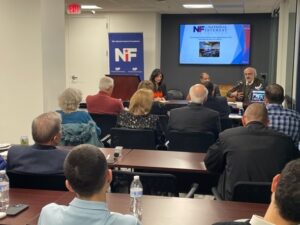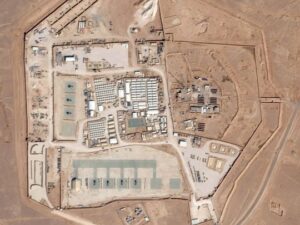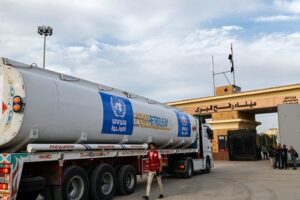
The National Interest Foundation Newsletter
Issue 222, February 2, 2024
Welcome to our NIF Newsletter. This week, we recap Wednesday’s dinner conversation event regarding the importance of South Africa’s landmark case against Israel at the International Court of Justice, its merits, and where things stand with the process. Meanwhile, in our news headlines: we look into the growing concern over possible conflict between the United States and Iran, and analyze the problematic nature of hindering the vital aid work of the United Nations Relief and Works Agency for Palestine Refugees in the Near East (UNRWA) especially amid the massive ongoing humanitarian crisis in Gaza.
NIF Event

On Wednesday of this week, the National Interest Foundation (NIF) hosted a dinner conversation event regarding South Africa’s landmark case against Israel at the International Court of Justice (ICJ). The event included discussion about the importance and merits of the case, where things stand in the process, how the prosecution of cases works at both the International Court of Justice and the International Criminal Court (ICC), why South Africa submitted the case, and what implications the rulings will hold. The speakers also answered questions on what comes next in the efforts to halt Israel’s aggression, and much more. The panel consisted of Bruce Fein, former Associate Deputy Attorney General and a renowned legal-media fixture in Washington D.C. for more than 50 years; Sam Husseini, an independent journalist whose recent work has largely focused on Israel’s human rights violations in Gaza; and the event was moderated by Yasmeen Hussain, an attorney specializing in international humanitarian law who works as a legal advisor at Covington & Burling in Washington D.C.
The panel started by addressing why South Africa in particular decided to levy charges of genocide against Israel, noting that South Africa has been empathetic toward the Palestinian struggle for social justice due to their similar history under apartheid. When talking about Israel’s possible transgressions against the genocide convention, Bruce Fein noted that Israel has held an obligation to not commit genocide since it signed the genocide convention treaty and that the ICJ case was to merely find if genocide was being committed. In this way, the ICJ’s ruling that Israel must prevent genocide is not a new development. Furthermore, Fein stated that Israel is indeed committing genocide according to the definition provided in the convention which outlines that deliberately creating conditions of life calculated to physically destroy a people is considered genocide. Additionally, genocide has no threshold that numbers must pass, and even attempts and conspiracy to commit genocidal acts go against the convention itself. The ICJ’s ruling on January 26th announced that Israel must take steps to prevent genocide, but stopped short of calling for an immediate ceasefire.
In his remarks, Sam Husseini noted that the court’s findings, while not a complete solution and not fully enforceable, should not be dismissed because it is part of a longer process in the international rule-based order in which he believes the law will eventually prevail. On the topic of the United States’ role in the conflict, both speakers agreed that the U.S. has partial responsibility in the devastating War on Gaza and presents a roadblock to actionable legal rulings against Israel. Yasmeen Hussain summarized the two speakers’ viewpoints that Bruce Fein believes the ruling is important but would take more action from the U.S. to elicit change in Gaza, while Sam Husseini believes that the ruling and international community will play a key role in holding Israel to account.
When asked about the next steps that will be taken to deter Israel’s abusive actions, Sam Husseini expressed that one solution, among others, is that members of the UN may take multilateral steps in the UN General Assembly such as suspending Israel from the body, admitting Palestine as a full member, and setting up a tribunal so that at the very least, Israel starts to feel some massive pressure to end the war. Another solution that Fein put forth is for South Africa to gain affidavits from other countries to help garner legitimacy in this case. In their concluding statements, both Fein and Husseini highlighted the importance of U.S. citizens taking grassroots actions and leveraging their votes to elicit change on this issue.
To watch the entire event on our YouTube page, please click here.
News Headlines
Growing Concern Over Possible U.S.-Iran Escalations

The recent deadly attack on the U.S. military base in Jordan marked a worrying escalation in tensions between Iran and the United States. (Photo from AFP)
Escalations Between Iran and the United States Elicit Concern Over the Possibility of an Intensified Conflict
Over the preceding months, Iran-backed militant groups have conducted over 160 attacks on the U.S. military in response to the role that the Biden administration has played in supporting Israel’s destructive War on Gaza. The majority of the strikes carried out by these groups have been repelled and did not inflict any causalities; however, earlier this week, a drone strike killed three U.S. service members and wounded 34 at a base known as Tower 22 in northeast Jordan. According to accounts in the aftermath of the incident, the drone that struck the base may have been mistaken for an American drone, explaining why it was not shot down. Iranian officials have denied being involved in the attack, while the Islamic Resistance in Iraq, which is made up of multiple Iran-backed militias, has claimed responsibility. This has provided Iran with plausible deniability for the attacks, allowing them to achieve their interests without appearing to directly order the group’s actions. Following the attack, U.S. President Joe Biden issued a statement claiming that the U.S. would “respond,” insinuating that the United States would retaliate and hold Iran responsible for supplying the drone used in it.
Experts are concerned that this drone strike and the subsequent response that will follow from the U.S. will likely only serve to balloon the already rising tensions in the region. The United States is slowly showing signs that it may once again become embroiled in Middle East conflicts. National Security Council spokesman John Kirby expressed that while the U.S. seeks to hold those responsible for the attack to account, the administration does not plan on getting directly involved in another round of Middle Eastern engagement. However, U.S. involvement seems ever more possible in the face of recent attacks against American bases in Syria, Iraq, and Jordan, and with the ongoing Red Sea crisis. If the United States chooses to respond to these attacks in a heavy-handed manner, then conflict in the Middle East could potentially spread like wildfire and may lead to deeper U.S. entanglement in the region. This would cause a host of security and economic issues that would impact U.S. interests both abroad and domestically. In fact, earlier this week, it was reported that oil prices are on pace for their first monthly gain since September, in response to fear that the United States and Iran stand on the brink of a potentially more direct confrontation in the Middle East. If this was to manifest, economic commentators have outlined that it would pose an expected risk to crude supplies in the region and the energy market itself as a whole. Just as so many others are closely monitoring the United States’ anticipated response to the attack in Jordan, traders and those involved in the global economic market are doing so as well.
Preventing a larger and wider-scale war in the Middle East will require the U.S. to tread lightly and avoid confrontation with Iran. When considering their possible responses, the Biden administration should think twice before targeting Iran directly, which would undoubtedly escalate tensions. Instead, the United States needs to strike a balance between deterring possible future attacks while containing any risk of igniting a direct conflict with Iran. As such, most military analysts have predicted that direct retaliation on Iranian territory is unlikely and would be imprudent. In the context of a possible broader dispute, both the United States and Iran must take steps to de-escalate current tensions and mitigate the possibility of an all-out armed conflict. Thus, it would be wise to seek diplomatic avenues of engagement to ensure that the situation is not exacerbated.
For months now, one way in which many social justice and peace activists have been advocating that the United States could de-escalate regional tensions is by using its leverage against Israel to demand a lasting ceasefire in Gaza. Most of the hostilities that have flared up in recent months are due to outrage regarding Israel’s reprehensible War on Gaza, and it seems probable that the entities involved in regional tensions will continue their actions unless a ceasefire is implemented. A lasting ceasefire could provide an important juncture to allow hostilities to dissipate, not to mention putting an end to the devastation of Gaza and its citizens. Whether or not the United States gets heavily involved in the region has much to do with how prolonged the War on Gaza is, as the longer that it carries on, the more likely that it could be drawn in. This would also increase the risk of future attacks like the one that took place this week, and therefore, the Biden administration should make achieving a lasting ceasefire in Gaza its top priority.
Problematic Nature of Hindering the Vital Humanitarian Aid Work of the UNRWA

UNRWA provides essential services to Palestinians including food, water, shelter, and medicine. (Photo from Getty Images)
UNRWA Funding Cuts Hinder Vital Humanitarian Assistance in Gaza
Israel has accused approximately a dozen United Nations Relief and Works Agency for Palestine Refugees in the Near East (UNRWA) employees of being involved in the October 7th Hamas attacks. UNRWA immediately fired nine employees and launched an investigation in an attempt to mitigate the blowback from these accusations. The UN Secretary-General confirmed that the investigation was independent, and that the UN Office of Internal Oversight Services is involved. However, since these accusations surfaced, 18 donor countries – Australia, Austria, Canada, Estonia, Finland, Germany, Iceland, Italy, Japan, Latvia, Lithuania, Netherlands, New Zealand, Romania, Sweden, Switzerland, the United Kingdom, and the United States – have removed their funding for the aid agency. Many of these countries were among UNRWA’s top donors in 2022, and account for over three-quarters of the organization’s funding. UNRWA chief Philippe Lazzarini was shocked that there was such a harsh response to the alleged actions of a miniscule group of staff. The accusations were seen by some as a political move that came just a day after the International Court of Justice (ICJ) ruling which required Israel to restore provisions and aid to Palestinians in the face of the destructive War on Gaza. It also takes place at a particularly troubling time, as civilians in Gaza are in desperate need of relief services which UNRWA is a vital source of providing.
Even prior to the ongoing War on Gaza, 80% of Palestinian civilians there were reliant on humanitarian aid resources, according to UN reports. The over 2 million people in the besieged enclave depend on this now more than ever, as the war and mass citizen displacement continue. It is estimated that around 1 million Gazans, approximately 45% of the population there, have been sheltering in UNRWA schools, clinics, and other public buildings. Human Rights Watch has also highlighted how UNRWA provides critical services for millions of Palestinians such as food, water, shelter, education, and health care. UNRWA employs over 30,000 Palestinians, 13,000 of whom work in Gaza, making it a large organization with an important mobilization capacity. In light of the recent developments, a spokesperson for UNRWA stated that they would be forced to cease their operations due to a lack of resources if funding was not restored by the end of February.
Observers have noted that there is no evidence of institutional collusion between Hamas and UNRWA, and that the few accused workers merely have jobs with the latter organization. The fact that only 0.09% of UNRWA employees in Gaza are being accused of any wrongdoing should demonstrate the absurdity of impugning the entire organization and hindering its vital work to deliver much-needed humanitarian services. The assistance is not possible without the foreign aid that UNRWA receives, as the organization relies heavily on donor contributions from UN member states, which account for nearly 90% of their overall funding. The cuts to UNRWA funding are an immoral form of collective punishment, and regrettably impede the efforts to provide aid where it is desperately needed. Doing so will only exacerbate an already dire humanitarian crisis, and lead to more suffering and animosity.
The sheer notion that all of the accused employees were bad actors itself remains suspect. The confessions and underlying intelligence regarding them were obtained through various methods of torture and unlawful detainment which, according to the National Health Institute, tends to make confessions unreliable. Israeli authorities’ use of such abusive practices is well-known amongst international watchdog organizations, who point out that it provides poor actionable intelligence. Confessions like these are not only unreliable, but they are also unethical as well. Israel’s actions in its War on Gaza have been littered with credible allegations of human rights violations being committed, including the recent discovery of dozens of tortured victims’ bodies in a school in Gaza, and thus it does not come as a surprise to many that abusive methods are utilized in information gathering as well.
To mitigate the massive ongoing humanitarian crisis in Gaza, countries who have suspended funding for the UNRWA should reinstate their donations. This is especially important considering that some of these nations are directly contributing to the suffering in Gaza through unwavering military and arms assistance to Israel. At the very least, it is paramount that aid agencies like UNRWA receive the support that they need to carry out their essential and impartial humanitarian work. The Director-General of the World Health Organization (WHO), Doctors Without Borders, and 21 different humanitarian organizations have called on donors to not suspend their crucial funding. It is unconscionable that thousands of civilians, through no fault of their own, should be left to suffer due to the purported actions of a few individuals.
Enter the text or HTML code here
